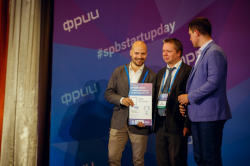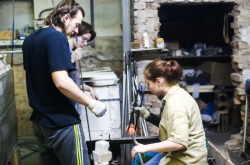Sylvia, why did you come to Saint Petersburg?
I came here to study the eco-system of the innovative entrepreneurship. So, I visited several startup-accelerators, as well as had several official meetings. That is what's necessary to understand how venture funds, business angels, private investors and whatever forms the local innovative eco-system work. I was always interested in such eco-systems, no matter where they are, as they are what gives opportunities to young entrepreneurs. The startups I invest in will only profit from me having business contacts all over the world — Saint Petersburg included. Also, I became a mentor for three young entrepreneurs from Saint-Petersburg. So, I have to know the innovative eco-system they are in, with whom they have to communicate and what kinds of investors are here — one has to know such things for a startup to survive.
What are the differences between investors in Russia and the USA?
Actually, in lots of aspects they are similar. Still, in the USA business angels invest in a project at its early stages, and here they prefer investing in more developed and established startups. For instance, all the startups I invested in had yet to bring some stable income. In Saint Petersburg, investors seek projects that already earn.
For our investors it's important to see the progress and understand what they'll get after investing in a startup.
It is essential both for investors in Russia and the USA. The difference here is how we assess the startuper. Personally, I am very particular about the projects I want to invest in. For me, it's important to see that the girls do something, solve problems, move forward and break barriers. That doesn't mean that I expect an increase in income right on the spot. But I want the women I invest in to achieve something. For example, if a girl gets to meet the industrial partner and can start discussing collaboration — that's a great step forward. And this is some progress I can see. Does that mean that I can get my investments back? No. But a startupper has to know how to bring her plans to life.
To some extent, investors take risks by investing in startups on their early stages. Risking is especially hard for business angels in Saint Petersburg. And I love this risk, if I see that a fledgling entrepreneur is sure of her project and achieves some intermediate objectives on the way to her big dream.
What are the criteria of progress?
This depends on the industry. If it has to do with manufacturing, I want the entrepreneur to already have the product and be able to present it. In biotech industry, for instance, it's totally different. This field has a lot to do with testing, so the startuper has to work out collaborations with partners who will help with research, introducing the innovative product to the market, etc.
Is there any common way for creating a successful startup?
Well, that also depends on the industry, but we've devised something like a recipe for being successful. First of all, a fledgling entrepreneur has to know people and know how to work out the necessary contacts. If you have even the smallest opportunity to meet the investor — take it. Do networking, as any of the people you know might become a link to finding the money for your business. Secondly, education is the key to success. You have to use anything to learn what's related to your startup, be it lectures at a university or some video-aids. A startuper's independence is both something good and bad. The good thing is that you're your own boss. And the bad thing is that you have to know how to get it all together and reach your goals. A startupper doesn't have a boss that can control him. Sometimes, you just don't do something on time, or simply forget about it. That's why having a partner, a friend is essential — that'd be someone who will monitor your effectiveness and constantly check, whether you've done everything you wanted for the past week.
What about startups based at universities — do those have more advantages or drawbacks?
For university startups, it's especially difficult to get funding once they leave their laboratories. Those who've dealt only with technologies before find it hard to commercialize their product. Also it's hard to find the funds that will let you move forward. That's why it's so great that ITMO has business accelerators, as well as partnerships with venture organizations, investment funds and the like, as all of this is most important for startuppers.
In the USA, when one launches a startup at a university, the pressing question is who will own the technology — in other words, will have the intellectual property rights. I don't know about Russia, but in the USA this is one of the key questions.
Why did you decide to only work with female entrepreneurs?
There have been many research that showed that women use money more effectively. Women are better at leadership, than men. That is why I invest in women. Also, I want to leave some sort of heritage to my children, like my mother and grandmother did. I want to invest in the next generation, give it a chance to be better. When the next generation has the necessary resources, good mentors and developed eco-systems, new entrepreneurs become more successful, produce better products and make life better.
Are there any difficulties that only female entrepreneurs face?
The main one is that they lack confidence in themselves. Lots of women know what they have to do, but when you ask them about their ideas they get confused. So, you have to press on: "Tell me of your idea!" Feedback is what's really important for female startuppers, they need approval. Men face this problem, as well, but for women it's harder due to their inner dialog. The second problem women have to overcome is combining two roles: mother and business-lady. Even if you're twenty and you only start your business, you still think about the time you'll have kids. So you ask yourself — maybe it's better to stay at home? That's a hard choice to make, and I think both working and being a mother are great things. I have my own special way of dealing with this problem. I don't tell my children that I need to go to work and that's why I'm not spending time with them. I tell them that I love them, and will always be there for them, and I love my work. Sometimes, my children go to different work-related events with me. They see that I like what I'm doing, so they don't hate my job.
What will you teach to the girls from Saint Petersburg you've become a mentor to?
I always start with asking the startuppers: what do you think your problem is? What's the challenge? And why is it so? When we find the problem, I give the homework — to try solve it. And that repeats again and again. That's what's essential for the startup to live, to be tested on the market and constantly improve.
As a result of the business-weekend at ITMO, the authors of three projects received Ms Ma's mentorship, as well as residency in the SUMIT startup-accelerator. Those were an online platform for mothers who want to become PR-managers for companies that deal in goods for children, an online platform that lets qualified IT specialists from Russia come in contact with startups and small enterprises all over the world, and an online service for making reservations on different quests. Also, a startup for making holograms on chocolates got a bonus SUMIT residency. The authors of these projects did best during a pitching session where they've presented their project to a jury.





